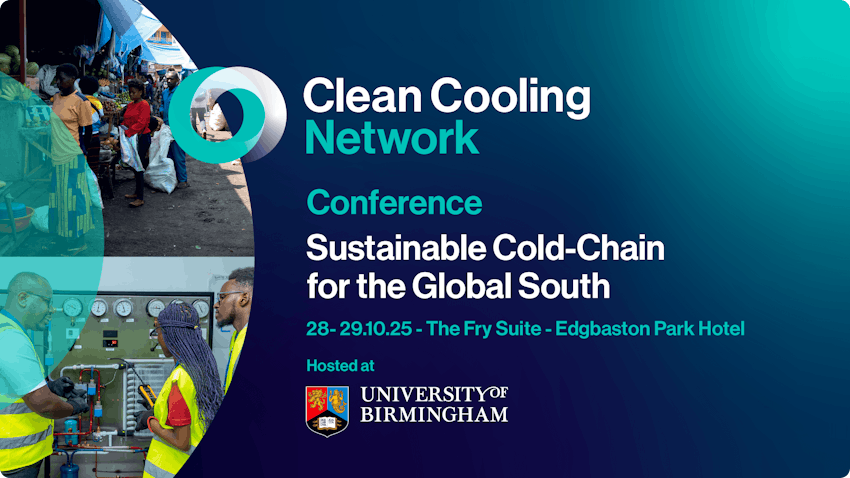Strengthening Africa’s Cold-chain Capacity: Lessons and Impact from Four Foundation Course Cohorts

By Peter Ongalo, Communications and Outreach Officer, African Centre for Technology Studies (ACTS)
Access to sustainable cold-chain systems is increasingly recognised as a critical driver for food security, livelihoods, and climate resilience in Africa. Since May 2024, the African Centre for Technology Studies (ACTS), in partnership with the Africa Centre of Excellence for Sustainable Cooling and Cold-chain (ACES) and the Clean Cooling Network (CCN), has been at the forefront of this agenda through the Cold-chain Foundation Course.
Over 55 early-career professionals, agripreneurs, engineers, and health specialists have now graduated from the four cohorts delivered between May 2024 and August 2025. These courses equip participants with the knowledge, skills, and networks needed to tackle postharvest losses, improve food and health systems, and create sustainable and equitable business models for cooling and cold-chains in Africa.
But it's not just about taking a course, we will be discussing the impact of this and other CCN global initiatives, on a wider stage, this October 28th & 29th at the Cool World Conference in Birmingham, UK.
Building Knowledge and Practical Skills
Each five-day training introduced participants to cold-chain fundamentals, refrigeration technologies, refrigerant choices, postharvest management, and regulatory compliance. Beyond technical content, the training emphasised entrepreneurship and business innovation, encouraging participants to design and pitch real-world cold-chain solutions.
A unique strength of the programme has been its balance of theory and practice. Sessions covered technical modules like telemetry, vaccine cold-chains, and quality control, while hands-on demonstrations and field experiments (e.g., ethylene testing, pre-cooling methods and road refrigeration transport) helped participants translate theory into application.
Immersive Field Visits
Practical exposure has been central to learning. Across the four cohorts, participants visited aggregation centres, packhouses, and logistics hubs, observing solar-powered cold storage, cooperative-led aggregation, and modern traceability systems in action:
- Instaveg Ltd (Cohort 1, May 2024): Packhouse operations and farmer aggregation serving export markets.
- Jungle Harvest (Cohort 2, Sept 2024): Herb production for international markets, solar-powered cold rooms, and export standards.
- Kinale Aggregation Centre & Tawi Fresh (Cohort 3, April 2025): Cooperative-led pre-cooling and solar-powered cold storage under the Try Before You Buy (TBYB) model.
- Kinale Aggregation Centre & Tigoni Grown at Tilisi Logistics Park (Cohort 4, Aug 2025): Integrated supply chains, advanced packhouse technologies, and data-driven logistics.
These experiences gave participants tangible insight into how cold-chains connect farm-level production to high-value markets.
"This training was truly hands-on, and it felt great to gain insights directly from farmers and suppliers. I would definitely recommend it to people beyond the agribusiness sector." – Keziah Khalinditsa, Participant, 4th Cohort
Empowering Youth and Women
The programme deliberately targeted youth and female professionals, creating an inclusive platform for leadership in cold-chain innovation. For instance, the 3rd Cohort (April 2025) comprised 12 participants, two-thirds of whom were women, aged between 23–34 years, drawn from diverse counties and sectors.
Participants also developed and pitched business solutions. Notable examples include:
- A fish cold-chain business case in Taita Taveta (Cohort 3), addressing losses in aquaculture.
- Value-added dairy and integrated livestock farming solutions (Cohort 4).
Participants in the 3rd cohort
"The training was a big eye-opener. Realizing how much can be saved in comparison to the losses we incur postharvest was incredible. This is an opportunity that needs tapping into." – Participant, 3rd Cohort
Outcomes and Impact
Evaluations across all cohorts show overwhelming satisfaction and relevance:
- More than 85% of participants agreed the courses exceeded expectations in content, delivery, and practical exposure.
- Participants cited greater understanding of cold-chain technologies, from pre-cooling and refrigeration cycles to compliance and telematics.
- Many committed to training peers, reducing postharvest losses, and launching agribusiness ventures in their communities.
- The courses also fostered lasting peer networks, with alumni actively exchanging ideas, opportunities, and updates via digital platforms.
Lessons Learned and Next Steps
While the training model has proven highly effective, participants recommended further improvements:
- More practical sessions and extended field visits, including exposure to health and pharmaceutical cold-chains.
- Follow-up mentorship and incubation support for entrepreneurial ideas.
- Better internet-enabled venues to support hybrid learning and virtual expert sessions.
- Localised case studies for different value chains such as dairy, fish, horticulture, and pharmaceuticals.
ACTS is now exploring ways to integrate these suggestions into future cohorts and sector-specific training modules.
Conclusion: A Growing Movement for Clean Cooling
The Cold-chain Foundation Course is more than a training—it is catalysing a movement for sustainable cold-chain solutions across Africa. By combining knowledge transfer, practical exposure, and entrepreneurial innovation, CCN and ACTS are empowering a new generation of leaders to drive food security, climate resilience, and inclusive growth.
With momentum building, ACTS’s role as a regional SPOKE of CCN-ACES continues to connect global expertise with local action, ensuring that Africa not only benefits from but also leads in clean cooling and cold-chain innovations.
Let's keep this momentum going

At the Cool World Conference, 28th & 29th October 2025, Birmingham University, UK, we will be discussing these exciting results with colleagues from Africa and our India Centre of Excellence to highlight the positive, real impact that training in cold-chain is having across communities.
Join us in Birmingham at this collaborative event, and meet a wide range of stakeholders, including academics, Development Agencies and NGOs, industry, and investor groups, to share ideas, make connections, and develop thinking around clean cooling and cold-chain.















